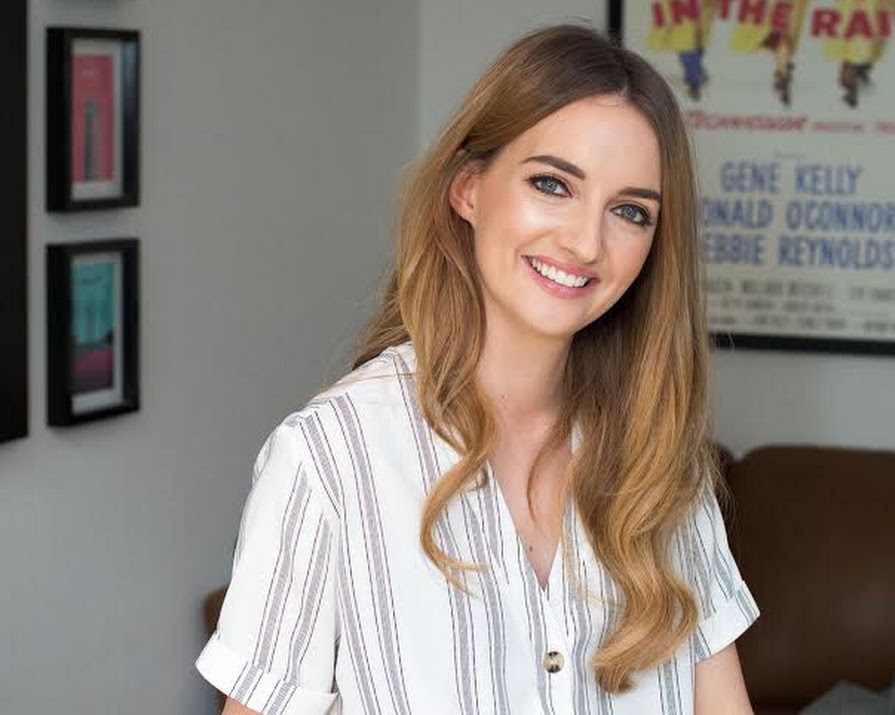
By Dominique McMullan
02nd Jul 2018
02nd Jul 2018
Women are making their mark in the world of business like never before. In every industry and at every level, we look to women who’ve made it their own as an example for us to do the same. For our latest series, entitled ‘How She Got Her Job‘, we ask women who have achieved stunning success in their field to tell us how they got there, and their advice on how we can join them.
Caroline Foran has always been a great communicator; from her start as a receptionist all the way up to her career as a journalist and editor. It is only in the last two years that she has added ‘author’ to her job description. Caroline also runs GAFF Interiors with her business partner and friend Jo Linehan, ghost writes and edits other non-fiction, and writes freelance features for a host of Irish publications.
What was your favourite subject in school?
My favourite subject in school was art because it was just so much fun and never felt like work; I didn’t take to art for the long run but I did stick with the idea of merging my interests and happiness with how I make a living.
What was your first job, and what other jobs have you had since?
My first job was working as a receptionist in a travel agency while I was still in secondary school and I loved it; my mum worked there at the time so she helped me get my foot in the door and I worked for a few hours every Saturday. It was so liberating to have earned my own bit of cash each week. I learned really quickly how much I like dealing with different people and that communication was one of my best skills. My first proper full time job was doing data entry for events listings at entertainment.ie, which was a dream come true (though that might sound like no fun to some people). For me it was about being in a creative buzzy space when there were so few online editorial workplaces at the time. Again, as people were reviewing movies and interviewing big stars from film and music, I found myself ‘is this actually work?’ I worked my way up to Editor there and have worked as a journalist/editor ever since. Only in the last two years have I added ‘author’ to my job description.
What does your daily routine look like?
My daily routine is all over the shop; I don’t really have one at all to be honest, but I will try to get up early (not easy for me, I’m a sleeper), go to the gym (3 x per week if I can) and have a healthy breakfast before sitting down to tackle my ‘low hanging fruit’ of emails and easier things, which I do as a warm up before I sit down to a meatier project such as writing a feature or working on some book chapters or editing some copy. At the moment, I have two books out so my time is spent doing work that has spun off from those, I help to edit and ghost write other non fiction books too, I run GAFF Interiors with my business partner and friend Jo Linehan which is our interiors obsession come to life, and then I write freelance features for a whole mix of Irish publications, online and in print.
What’s your favourite part of the job?
The best part of my job is that I manage my own time, I have nobody to report to and I can suit myself entirely. If it’s a gorgeous sunny day I’ll just rejig things and turn a bit nocturnal. I am entirely in control of myself and that is just the best feeling.
What’s your least favourite part?
The less than favourable parts are probably a lot of time spent alone; I wouldn’t say that I am an extrovert but I do feel a bit lonely sometimes if I’m alone for the full 8 hours (though my dog Bear keeps me company). Sometimes my fiancé comes home after work and I’m desperate to have the chats because I’ve been starved of human company all day! It’s also very hard to manage money; freelance work is so inconsistent and it ebbs and flows. You could get paid for a few projects at once and have to plan so that you don’t blow it all because then there may be months where there’s very little coming in. I’m still not very good at this but am getting a bit better.
What are the key skills you need to make it in your industry?
The necessary skills for my industry are being flexible, adaptable, a strong work ethic and ability to work to your own initiative, very creative and an ‘ideas person’, and to have more than one thing going on for you; for example, you will do well in media if you can write but also if you can edit other people’s work and develop your bigger picture skills where you’re managing all kinds of content. Also it helps a lot if you can develop skills to be on camera or comfortable in front of an audience; this just gives you the best chance of success I think, in this particular industry (if, like me, you want to keep things varied).
What are the most important lessons you’ve learned for success in your career?
The most important lessons I have learned are as follows: you have never finished learning, you will always make new mistakes even when you think you have it all figured out and that is okay. There is room for everyone, someone else’s success doesn’t take from yours and you have to just focus on doing your own thing. Don’t have an end goal in mind but rather a lifestyle in mind; that way you enjoy the day to day as opposed to hurtling towards some end point and then you’re left saying ‘what now?’.
Any regrets?
For so long I regretted changing jobs from one that I adored to one that didn’t suit me – and it was the job that brought on all of the anxiety that formed the basis of my first book – but to say now that I regret it would mean that I wouldn’t be where I am today, had things been different. It sounds cliché to say ‘no regrets’ but it really is the best way to live and I firmly believe that everything happens for a reason. From a really crappy experience, I now have two bestselling books that are about to go international. So that’s good!
What do you wish you knew when you were starting your career?
I wish I knew how to code; if you can add any sort of tech savviness to your skillset, you will be worth your weight in gold. Other than that I learned everything as I was meant to learn it.
What’s the number one piece of advice you would give to young people starting out who want to follow in your footsteps?
The best advice I would give to people who want to follow in my footsteps is to make yourself very adaptable and indispensable in a company that you want to do well in. Give it your all until you earn your stripes and make meaningful connections (as it is a very small industry and connections and your reputation are everything). Then you can afford to tailor things to suit you. Try loads of different things and learn not just what you like but what you don’t like, so you can really hone things down the line for yourself. Lastly, have something very solid to back up your social media; be a really good writer or a good editor or a good presenter – whatever. Let your social media following be second tier to whatever it is you do and love and are good at.
Pic credit – Thomas Honan























